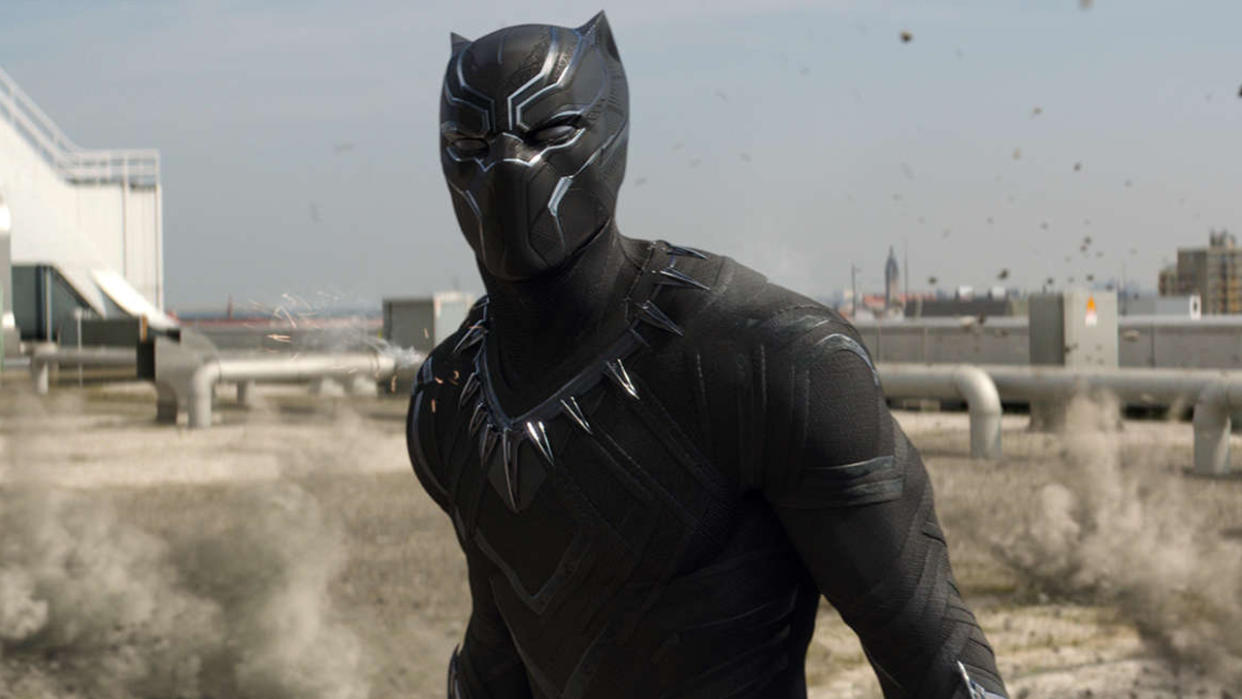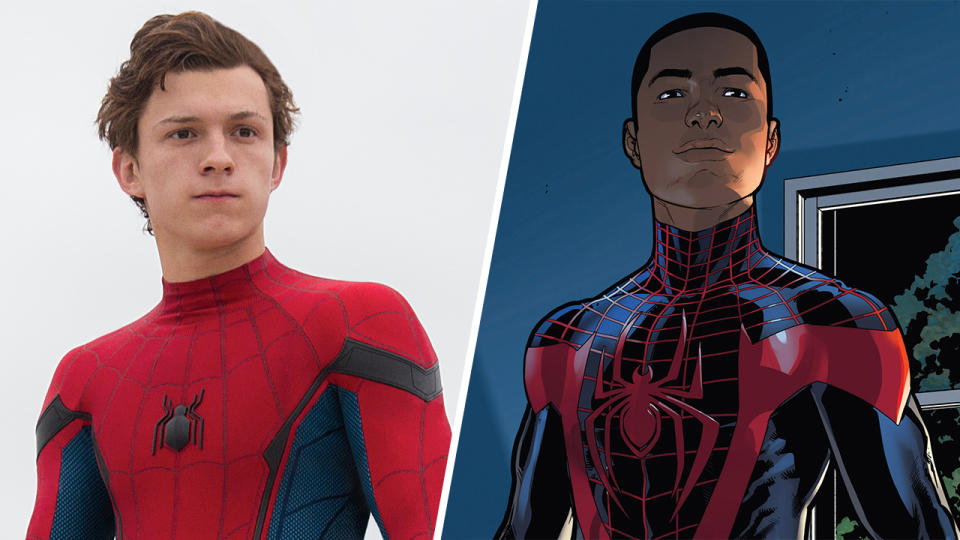Marvel's 'Black Panther' and 'Spider-Man: Homecoming' Lead New Era of Diverse Superhero Films

Spider-Man: Homecoming is a Spider-Man movie for a new generation -- a generation that desires to see a franchise reflective and representative of the world they currently live in. Yes, Tom Holland's Peter Parker still has to balance crime fighting with homework; and yes, he's still white, but the cast of characters around him are not.
"That was the intention. You know, because it's 2017," John Francis Daley, who co-wrote the film with Jonathan Goldstein, told ET at the movie's Los Angeles premiere on June 28.
"It was also important to make this the real world. The Marvel universe lives in a real sort of place, so we wanted to be a part of a real school. The real school is in New York," added Goldstein.
The Spider-Man first created by Marvel Comics' Stan Lee and Steve Ditko in the 1960s did live in a "real sort of place," but a seemingly less-than-realistic version of its Queens, NY, setting. Parker's high school bully, Eugene "Flash" Thompson, is described as a stereotypical jock in the comics, with actors Joe Manganiello and Chris Zylka portraying the big, buff (and white) character in 2002's Spider-Man and 2012's The Amazing Spider-Man, respectively. Homecoming's Flash is instead played by 21-year-old Guatemalan-American actor Tony Revolori, who told ET that he's "proud" to be a part of a film that gives "opportunity to diverse people to be the best."
"That's the type of diversity we need in Hollywood," Revolori added.
Parker's supposedly blonde love interest, Liz Allen, is instead played by African-American actress Laura Harrier; Zendaya portrays a new character, Michelle "MJ" Jones, who will reportedly play a larger part in the ongoing version of the franchise; and Hawaiian-born Jacob Batalon plays Ned (just Ned). Rounding out the non-white cast are actors like Garcelle Beauvais, Hannibal Buress, Kenneth Choi, Selenis Leyva and Donald Glover, whose cameo as Aaron Davis seemingly brings together an alternate universe where Miles Morales (voiced by The Get Down's Shameik Moore in Sony's upcoming animated version) is the Ultimate Spider-Man.

Marvel Studios
"I think when you see shows and movies that are led with ethnic characters [it inspires more to do the same]," said Beauvais, who plays Liz's mother, Doris Toomes.
Sure enough, Spider-Man: Homecoming will soon be followed by 2018's Black Panther, starring Chadwick Boseman as T'Challa, Lupita Nyong'o, Danai Gurira, Angela Bassett, Michael B. Jordan (who made headlines as a black Johnny Storm in 2015's Fantastic Four), Daniel Kaluuya, Forest Whitaker, Phylicia Rashad and Sterling K. Brown. The film is a significant step for superhero franchises and black Hollywood alike.
"It is politically astute. It is incredibly socially relevant," said Brown, who plays a new character, N'Jobu, in Ryan Coogler's adaptation. "It's not just an action film; it addresses the climate today of Africans and African Americans -- across the country and across the world -- in a way that people will really be excited about."
Gurira, who plays Okoye, told ET that the film holds special significance because "I grew up seeing a lot of superheroes and they didn't look like me and they certainly weren't in Africa. Growing up in Africa, we were looking for images we couldn't always find."
It's not as though other superhero films haven't tried -- people of color have been peppered in past Marvel films, including Halle Berry in X-Men, Don Cheadle (who replaced Terrence Howard as James Rhodes) and Samuel L. Jackson in Iron Man 2, Idris Elba in Thor and Anthony Mackie in Captain America -- they just didn't try enough. Guardians of the Galaxy saw the MCU take a turn in the right direction, with a cast that featured Zoe Saldana, Dave Bautista, Djimon Hounsou and Benicio Del Toro, while Ant-Man included Tip "T.I" Harris and Michael Pena in the main cast. Chiwetel Ejiofor, Benedict Wong and Benjamin Bratt starred in 2016's Doctor Strange, though the film made headlines for what was perceived as whitewashing -- an ongoing problem onscreen -- with the casting of Tilda Swinton as a Celtic version of the previously Asian character The Ancient One. (The issue was exacerbated by the concurrent casting of Scarlett Johansson, a Marvel regular as Black Widow, to lead the live-action adaptation of the anime classic Ghost in the Shell.)
After next year's Black Panther, Marvel's lineup includes Avengers: Infinity War, which will bring together the older, whiter "phases" of Marvel releases with the more diverse casts of its newer installments. And 2019 will see the first female-centered Marvel movie with Brie Larson in Captain Marvel. (Following the box office and critical success of Gal Gadot's Wonder Woman, the anticipation for another female superhero has only increased.)
MORE: How 'Wonder Woman' Can Teach the Entire Superhero Genre a Lesson and Put DC Comics Back on Top
But Marvel is not alone in its push for representation onscreen. DC Comics, too, has slowly been ushering more diversity into its films with 2016's Suicide Squad starring Will Smith, Viola Davis, Jay Hernandez and Adewale Akinnuoye-Agbaje in significant roles. Of course, this summer showed DC -- and the world -- the fierce force of girl power with the Patty Jenkins-directed Wonder Woman, which broke records, including the biggest domestic opening of all-time for a female director. Later this year, diverse faces like Ray Fisher and Jason Momoa will take center stage in Justice League, in which Joe Morton and Kiersey Clemons also have roles.
Representation of minorities in superhero films certainly appears to be on the rise, but if there's a lesson to be learned from Spider-Man: Homecoming, which opened to $257 million at the box office worldwide, it's that traditionally white roles can be successfully transformed and reimagined for people of color, and that including a more diverse cast only adds to the realism of the story.
"We're at a far better moment than we were at in the past," Gurira noted, "but there's a lot of work to be done."
Related Articles


